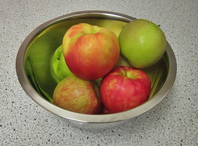
The high cost of buying organic food is well documented and many people simply can't afford the higher prices. So when you do buy organic, wouldn't you at least like to know that you are getting what you paid for and that you are not being overcharged? In furtherance of the ostensible answer to that question, I recently visited two major food store chains to see if consumers are getting what they pay for when purchasing organic apples. The results indicate that it holds true more than ever, that the buyer must be aware.
While at the first store, which is well known for its organic abundance, I found organic red delicious apples on sale for $1.99 per pound. Several of these apples were selected and placed in a provided bag for purchase. After checking out and leaving the store, I discovered that I was incorrectly charged $2.99 per pound, as the apples were mistakenly rung up as organic gala apples. It wasn't until one week later that I returned to the store with the receipt and one of the stickers from the apples, to bring the overcharged item to the attention of customer service. Appropriately, the store representative quickly apologized for the charging error and promptly refunded the full purchase price.
My second visit was to a more conventional food store with a significant organic selection. I looked to purchase 3 pound pre-bagged organic apples which were labelled $6.99 per bag and found two brands to choose from at that price and weight. Upon selecting a bag of apples, it appeared to be somewhat light for a 3 pound bag, so I decided to weigh multiple bags of each brand on the weight scale in the store. What I found was that the "3 pound" bags of organic apples varied in weight between a low of 2.3 pounds to a high of 3.1 pounds. Admittedly it is very difficult to pre-bag apples to come out to exactly the 3 pounds stated on the bag, just like it is difficult for every foot long hero to measure exactly 12 inches in length. But if for example you pay for 3 pounds of organic apples and only receive 2.3 pounds, you are receiving only approximately 76% of what you paid for. Accordingly, instead of paying $2.33 per pound for organic apples, you are effectively paying over $3.00 per pound. While that may only add up to a couple of dollars in overpayment for an individual, the total store windfall over the course of a few short weeks could potentially reach into thousands of dollars! How do you like them apples?
In that mechanical and human error is virtually inevitable, especially when purchasing fruits and vegetables (conventional or organic) which are not always readily identifiable, it is incumbent upon the consumer to pay close attention when checking out. The consumer cannot just assume that the underpaid and overworked cashier who rings up perhaps thousands of items per shift, is infallible. Overcharging, whether it's unintentional or not, appears to be a consumer reality in this day and age. Scrutinize every purchase and receipt and make sure you don't end up receiving only 76% of what your hard earned money paid for.
Long Island Lawyer
Paul A. Lauto, Esq.
www.liattorney.com


 RSS Feed
RSS Feed

